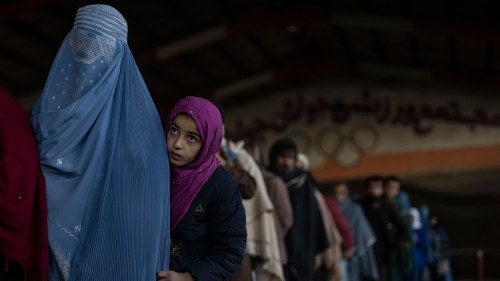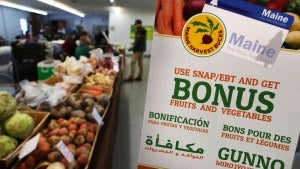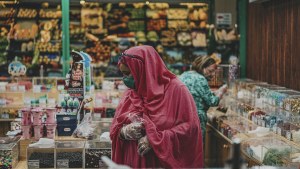Aid Crisis in Afghanistan, Urban Oasis, and Grabbing Cows
Check out our roundup of the week's top news and research in food, agriculture, and global development.

Top Story
Grain Deal Uncertainties
President Putin announced that the landmark Black Sea Grain Initiative will not be restored until the West meets Moscow’s demands to remove barriers to Russian exports of food and fertilizer. Western leaders contend that food and fertilizer products have remained exempt from sanctions and that Putin is trying to deflect blame from the war’s impact on growing food insecurity globally. With 57 percent of Ukraine’s grain having gone to low- and middle-income countries, a revived agreement is seen as vital for food security for many countries in Africa, the Middle East, and Asia.
Council Insights
SNAP Participation
“Understanding and addressing neighborhood factors is vital in enhancing SNAP participation and improving food access for people with lower incomes,” writes Katie Wilberding in a Global Food for Thought blog. “Tailoring strategies to account for neighborhood differences can more effectively address food insecurity and enhance food access.” Read the full blog on our website.
 Food and Agriculture
Food and Agriculture
Food and Agriculture
Aid Crisis in Afghanistan
WFP is ending food aid to two million people in Afghanistan this month due to a severe lack of funding. Now, food assistance will be provided to only a fifth of the 15 million people requiring assistance in the county. Women, who have become increasingly vulnerable since the Taliban takeover, will suffer especially from these cuts.
Disappearing Groundwater
Hotter temperatures due to climate change are drying out fields in India, leaving less moisture to soak into the soil and replenish groundwater storage. Indian agriculture is dependent on groundwater, which supports 60 percent of all irrigation in the country. The rate of depletion of groundwater aquifers is projected to increase at three times the present rate between 2041 and 2080.
A New Invasion
An international biodiversity body estimates $423 billion in annual economic damage comes from invasive animals, plants, and microbes. The report estimates that the collection of these invasive species played a major role in 60 percent of the world’s animal and plant extinctions, and that they will continue to threaten nature, human health, farming, and fishing.
Deeper Dive
What Is the Crisis in Afghanistan?
Due to funding shortfalls, WFP cut food assistance to a total of 10 million people in Afghanistan in 2023. The cuts leave many people struggling to feed their families, with some resorting to collecting and selling trash for meager earnings. Afghanistan is facing a dire humanitarian crisis as over one-third of the country goes to bed hungry every night. WFP urgently requests $1 billion in funding from international actors and individuals alike to address this crisis.
Resilience
Urban Oasis
A South African food garden founded by a group of retired women has turned into a beacon of hope for the community. Through consistently applying compost and manure over several years, they turned the sandy grounds into rich soil that is perfect for growing crops. The project also engages young people through agriculture internship programs, helping inspire them to pursue a career in the agriculture industry.
DC Report
WIC Faces Funding Crisis
The Special Supplemental Nutrition Program for Women, Infants, and Children (WIC) faces cuts amid rising demand and food costs. Roughly six million low-income Americans could be impacted starting in October. The Biden administration requested $1.4 billion in emergency funding to address the shortfall.
Big Actors
Reaching Self-Sufficiency
Saudi Arabia has achieved complete self-sufficiency in the production of dates, fresh dairy products, and table eggs, with excess export capacity. To improve food self-sufficiency, Saudi Arabia has invested heavily in desalination technologies and advanced irrigation techniques, such as loans over $400 million and allowing use of water reserves to cultivate crops in water-scarce regions.
Big Ideas
Grabbing Cows
Brazil has launched its largest ever operation to remove cows owned by illegal land grabbers from Indigenous territory in the Amazon. The operation aims to restore state control over the Ituna-Itatá Indigenous Territory, which experienced severe deforestation during Jair Bolsonaro’s presidency.
Ask an Expert
Is there still time for the global food system to generate solutions to environmental and health problems?
“Food systems are just as culpable for the accelerating global planetary health, human health, and poverty crises of our generation as they are capable of generating the solutions necessary to fix them. But the window of time left to leverage global will and capital to keep us from the brink of a food systems collapse is rapidly closing. The global food systems community must capitalize on the next set of mobilizing events...to elevate food and agriculture as a core component of global, equitable climate action and financing with strategic, long-term, and commercially viable solutions.”
—Distinguished Fellow Ertharin Cousin with Dariush Mozaffarian in Devex


Have a question about food and agriculture? Ask one of our experts at the Center on Global Food and Agriculture to get an answer in next week's Global Food for Thought!
Council Events
Did you miss one of our previous livestreams? Don't worry! They are all available on our website to watch at any time.
Other Upcoming Events
Just Roots: Fall Horticulture Workshop Series
Date: September 9
Time: 10:00 – 12:00 p.m. CT
Tropentag 2023 – Competing Pathways for Equitable Food Systems Transformation: Trade-Offs and Synergies
Date: September 20 - 22
Payments for Ecosystem Services: Win-Win Solutions?
Date: September 21
Time: 7:45 – 9:15 a.m. ET
Conservation Matters: Investing in People to Improve Watersheds
Date: September 28
Time: 12:00 – 2:00 p.m. CT
Soul Fire Farm – Farm Tour
Date: September 29
Time: 3:30 – 5:00 p.m. ET
Land Acknowledgement Statement
The Center on Global Food and Agriculture recognizes it occupies the ancestral land of the Kiikaapoi, Peoria, Kaskaskia, Bodwéwadmi, and Myaamia people. Indigenous communities around the world disproportionately experience the pressures of climate change, global conflicts, and the COVID-19 pandemic, while simultaneously stewarding 80 percent of the world’s biodiversity. These Indigenous tribes and nations are the original owners of this land and continue to be systemically erased by policies and practices that ignore their histories. To learn more about Indigenous foodways and practices, check out our 2022 blog series "Stewardship, Sovereignty, and Solutions."
Related Content
- Embracing Dandelions as Food and Medicine
- Going Beyond Regenerative Agriculture on Tribal Lands
- Expanding "638" to Enhance Native American Food Sovereignty
- Flavors and Culture: Food Systems Through Indigenous Women's Eyes
- A Thanksgiving Legacy: Fighting for Indigenous Food Sovereignty
- Native Food Sovereignty: Strengthening Connection to Culture
- Reconnecting to Indigenous Food Sovereignty Values and Practices
- Embracing Interconnectedness: How Indigenous Foodways Can Save Us







